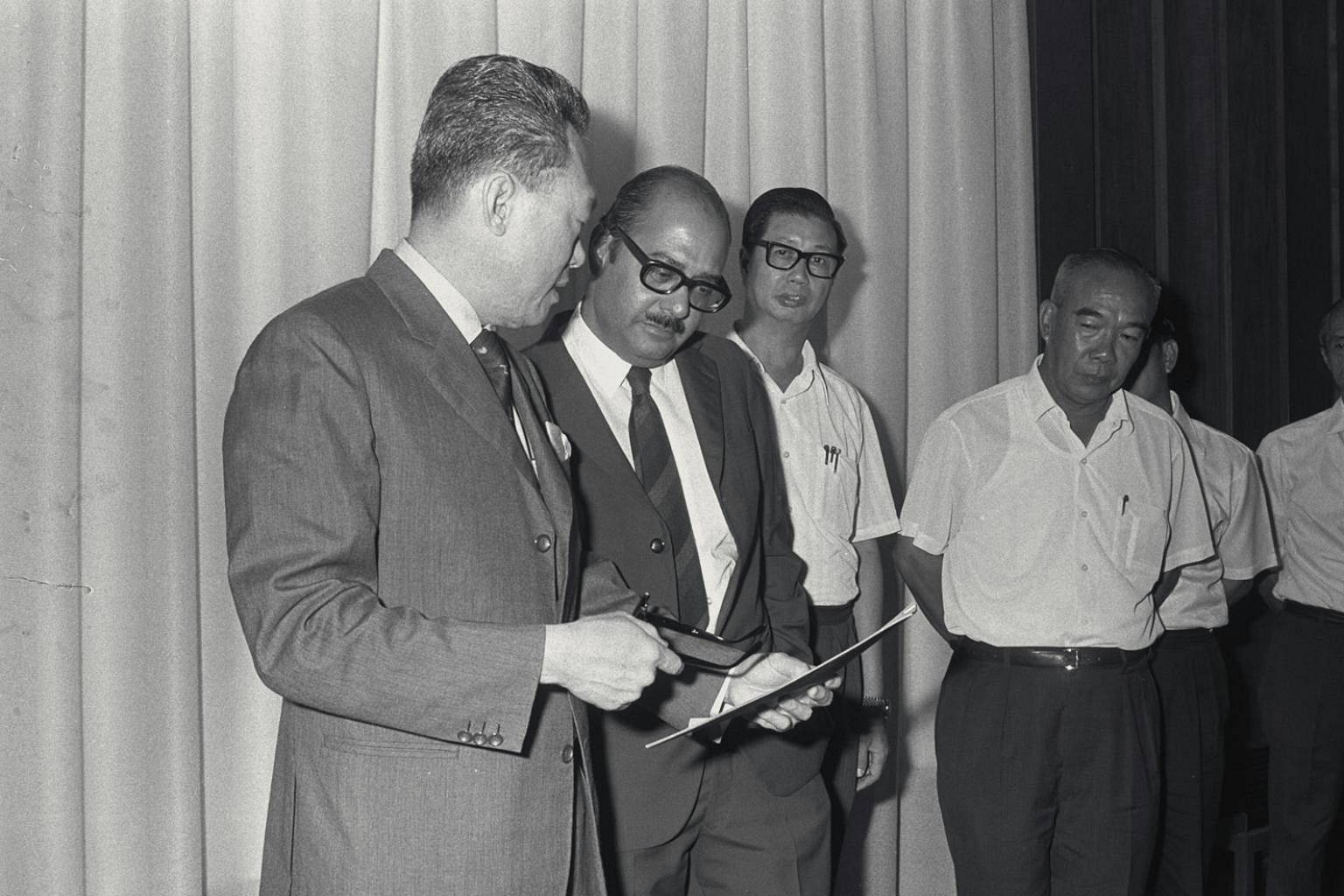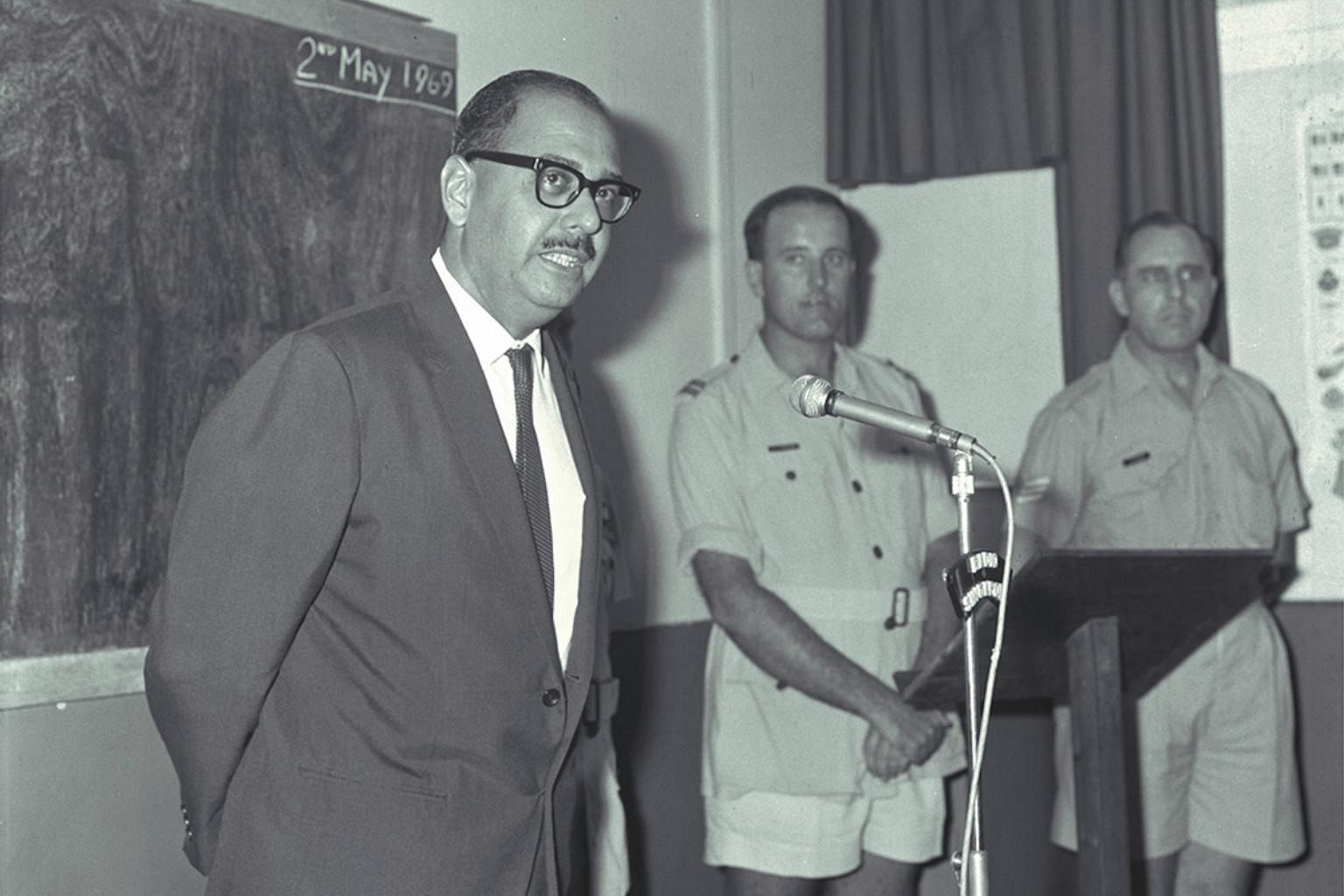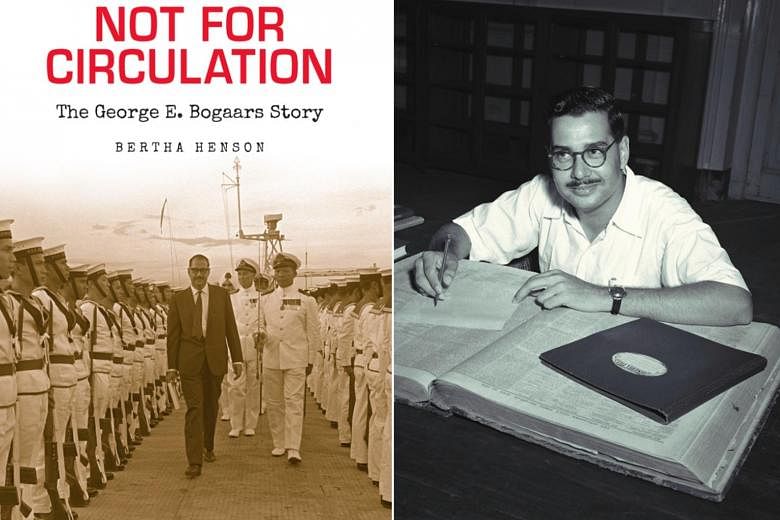SINGAPORE - The life and career of one of Singapore's pioneer civil servants, who survived the Japanese Occupation to head the intelligence agency Special Branch during Operation Coldstore against the communists and helped set up the Singapore Armed Forces (SAF), are chronicled in a book released on Monday (Oct 25).
Mr George E. Bogaars also led government agencies, including the Finance Ministry, in Singapore's early and tumultuous years.
Not For Circulation: The George E. Bogaars Story is written by veteran journalist Bertha Henson, who is currently an adjunct professor with the National University of Singapore (NUS) Department of Communications and New Media, and a fellow of Tembusu College at NUS. The book is an initiative of Mr Bogaars' former Treasury colleagues to mark his birth anniversary on Oct 25.
Mr Bogaars - or GEB, as he was known to friends, family and colleagues - died in 1992 at the age of 65.
His biography is pieced together from oral history recordings, essays and interviews. It details how the hardships of the Japanese Occupation, including a two-year stay in the malaria-infested Bahau settlement in Negeri Sembilan, instilled in the young Mr Bogaars a sense of mission and stake in the young nation's future.
He joined the civil service in 1952 when the institution, as the book observes, was in "chaos".
Organisation structures and priorities were constantly changed to fit local politicians' demands for rapid "Malayanisation", or replacing British expatriates with local-born residents after the war.
From nabbing rice thieves at Tanjong Pagar port as an assistant traffic controller to conducting social surveys for former deputy prime minister Goh Keng Swee - then a director in the Department of Social Welfare - Mr Bogaars' broad experience and access to Singapore's pioneer leaders were unparalleled.
When founding prime minister Lee Kuan Yew tasked a British intelligence officer to help turn the Special Branch from a police outfit into an intelligence agency, Mr Bogaars' name was offered as one of three civil servants who could head the reorganised branch.

"When it was clear the other two did not want the job, I knew that if I said no too, it would be very difficult to come up with other names," explained Mr Bogaars.
In the run-up to 1963's Operation Coldstore, he was privy to heated meetings among parties such as the People's Action Party (PAP), the Barisan Sosialis - formed by left-wing PAP members who had been expelled from the party - the pro-communist camp, and then Malaysian Prime Minister Tunku Abdul Rahman's government.
Operation Coldstore was a security operation that led to the arrest of more than 100 people on Feb 2, 1963. Many detained were politicians from Barisan Sosialis. The Government has maintained that those arrested were communist sympathisers plotting to subvert the state.
The Special Branch was put in charge of drawing up a list of those to be arrested, as well as the organisations and publications to be proscribed.
He said in an interview in 1981 with The Straits Times after his retirement: "I did not and do not have any qualms about the operation. I went into the Special Branch with my eyes open. If the Barisan Sosialis and their friends had won, we would all have gone down.
"I did not think the ones detained were innocent. Yes, they might be foolish but they were certainly not innocent."
Mr Bogaars was also one of three civil servants privy to the details of the Separation document ironed out between Mr Goh and then Malaysian Deputy Prime Minister Tun Abdul Razak in Kuala Lumpur on Aug 6, 1965.
Mr Lee's 1998 memoir The Singapore Story tells how, in the frantic days before Separation became official on Aug 9, he had called in Mr Bogaars, then head of the Special Branch, "to be quite certain he was confident we could contain any threat from the communists in an independent Singapore as long as we did not allow them to rebuild their organisation".
"He assured me that we could," Mr Lee wrote.

On the defence front, Mr Bogaars was most associated with setting up the SAF Training Institute in 1966. As permanent secretary of the foreign affairs and finance ministries in the 1970s, he was known for putting people at ease and not keeping a distance from his subordinates, unlike some other senior civil servants.
He overhauled the Budget process so that each ministry would submit, together with its annual budget proposal, a review of its major achievements against previous targets, and relate its proposal to targets for the new financial year.
In short, he came up with a framework for how Budget requests, instead of merely listing the line items to be spent on, should be linked to things to be achieved. This new system became operational in 1978.

He also set up a Treasury Coffee Club (TCC) for senior officers to interact with colleagues and discuss common work issues.
Mr Bogaars' experience with communists and communalists had left him with a keen sense of Singapore's vulnerability, and the need to tread a fine line between achieving political objectives and being a political actor.
He made it clear in an interview with the now-defunct Singapore Monitor newspaper that he was not interested in taking part in politics.
"I did not regard politics as the sole factor that shaped history. Politics was to me a fairly unsavoury business. That was how I felt, and I have no reason to change my view of politics even today."
In the 1981 interview with ST, he made a distinction between being politically aware and politically involved: "There is a clear difference here. It is a difference between the practice and science of it. I was interested only in the science of it."
He was one of the first two students to receive a Master of Arts degree from the University of Malaya, a predecessor institution of NUS. His master's thesis was on the development of the Tanjong Pagar Dock Company, which evolved into Keppel Corporation that he later helmed.
TCC members and Keppel Corporation, through the Keppel Care Foundation, are supporting the cost of producing the biography.
Sales proceeds will go to an endowment fund to support awards for top-performing history students at the NUS Faculty of Arts and Social Sciences, where Mr Bogaars studied.
Not For Circulation: The George E. Bogaars Story
By Bertha Henson
NUS Press/Paperback/202 pages/$25.68
Available at leading bookstores, including Kinokuniya.


